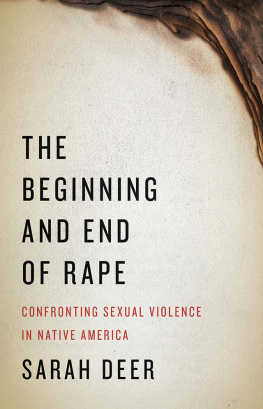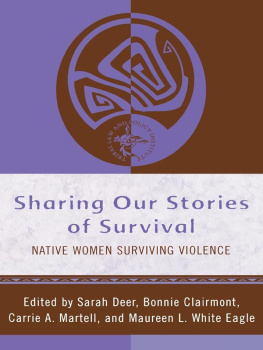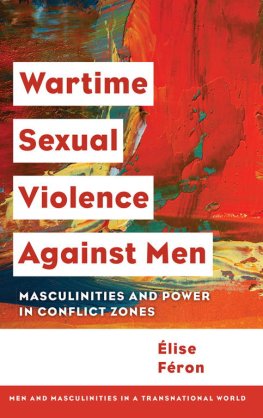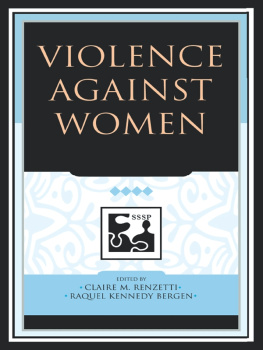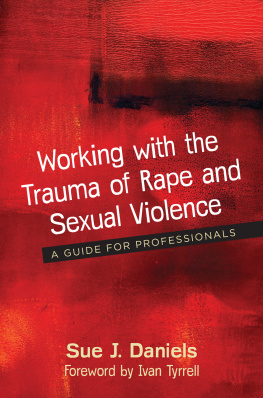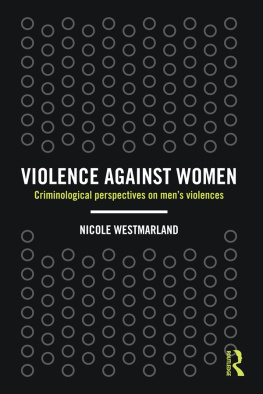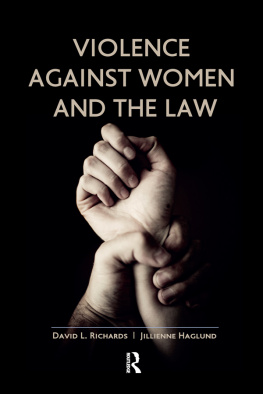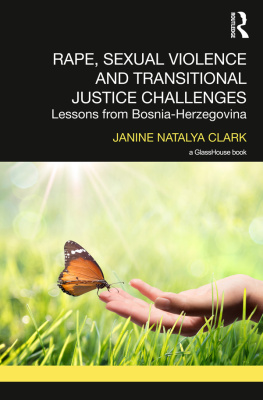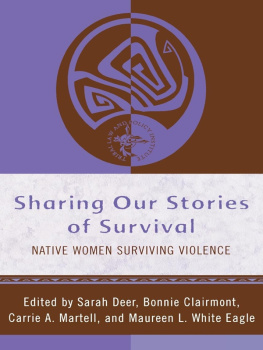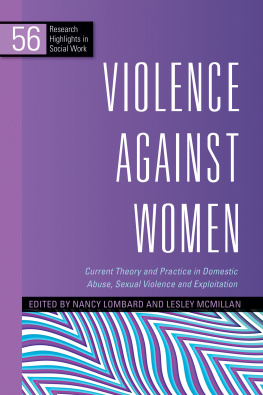The Beginning and End of Rape
Confronting Sexual Violence in Native America
Sarah Deer

University of Minnesota Press
Minneapolis
London
Poetry by Connie Fife reprinted in chapter 9 was originally published as Dear Webster in Reinventing the Enemys Language: Contemporary Native Womens Writings of North America, ed. Joy Harjo and Gloria Bird (New York: W. W. Norton, 1997).
Copyright 2015 by the Regents of the University of Minnesota
All rights reserved. No part of this publication may be reproduced, stored in a retrieval system, or transmitted, in any form or by any means, electronic, mechanical, photocopying, recording, or otherwise, without the prior written permission of the publisher.
Published by the University of Minnesota Press
111 Third Avenue South, Suite 290
Minneapolis, MN 554012520
http://www.upress.umn.edu
L IBRARY OF C ONGRESS C ATALOGING-IN- P UBLICATION D ATA
Deer, Sarah, author.
The beginning and end of rape : confronting sexual violence in Native America / Sarah Deer.
Includes bibliographical references and index.
ISBN 978-1-4529-4573-6
1. RapeLaw and legislationUnited States. 2. Indian womenCrimes againstUnited States. 3. Indian womenLegal status, laws, etc.United States. I. Title.
KIE3560.D44 2015
345.7302532dc23 2015017702
The University of Minnesota is an equal-opportunity educator and employer.
For Lynnea
Contents
Sovereignty of the Soul
L ETS TALK ABOUT EPIDEMICS .
Accounts from the New York Times, Washington Post, National Public Radio, and other sources have used the adjective epidemic to describe the extremely high rates of violence perpetrated against Native women. To make sense of the statistical data that consistently show that Native women experience the highest per capita rate of rape in the nation, journalists and activists have adopted a word we are accustomed to seeing within the context of disease outbreaks such as HIV or Ebola.
I think weve been using the wrong word. Its understandable: the word epidemic is used to attract attention to a particular problem that affects a growing number of people the longer it remains ignored or untreated. But this word doesnt quite fit. Merriam-Webster defines epidemic as a sudden quickly spreading occurrence of something harmful or unwanted. It is an attention-grabbing word (and one I admit I have used in some contexts), but on reflection it can be misleading. The connotations of the word allow society to absolve itself of blame. The word suggests that the problem is biological, that the problem originated independent of long-standing oppression, that it has infected our society, twisting human relations. A biological epidemic is not a crisis of human origin; it is the result of the unchecked spread of microscopic viruses and bacteria. The word epidemic also suggests a short-term, isolated problem. We reflect on last years flu epidemic, for example, and work toward ending the Ebola epidemic. Using the word epidemic deflects responsibility because it fails to acknowledge the agency of perpetrators and those who allow the problem to continue. The word also utterly fails to account for the crisiss roots in history and law. Using the word epidemic to talk about violence in Indian country is to depoliticize rape. It is a fundamental misstatement of the problem. If this book does nothing else, I hope to demonstrate why rape in the lives of Native women is not an epidemic of recent, mysterious origin. Instead, rape is a fundamental result of colonialism, a history of violence reaching back centuries. An epidemic is a contagious disease; rape is a crime against humanity.
Over the past twenty years, I have spoken to hundreds of Native women who have survived rape or domestic violence (usually both) throughout Indian country, from remote Alaska villages to Indian communities in dense urban areas. Most of my scholarship and activism has been directed toward the needs and rights of those survivors. I first began working with Native survivors of rape when I was an undergraduate at the University of Kansas in the early 1990s. I started volunteering at the local rape crisis center, called at that time the Douglas County Rape Victim Survivor Service (RVSS). I was twenty and eventually became a part-time employee. As a volunteer, I was trained to provide direct advocacy for victims who called us for assistance. Advocacy in this sense refers to a wide range of supportive services, which are offered at the request of a survivor, including accompanying survivors to the hospital, police station, or courthouse. We also offered private, confidential counseling over the telephone, and facilitated support groups for women who had experienced rape. In all things, we sought to provide compassionate emotional support. The women I met with and talked to during my first six years as an advocate served as the foundation for my lifes passion. I answered desperate calls in the middle of the night from women besieged by nightmares and insomnia. I met women in the local emergency room and stood nearby as they made the agonizing decision of whether to report their husband/boyfriend/girlfriend/cousin/friend to the police for sexual assault. I sat in the waiting room reserved for witnesses at the local courthouse for hours, sometimes days. I walked in Take Back the Night marches and rallies and facilitated support groups for women. I talked to mothers, sisters, friends, lovers who had to watch amazing, beautiful women in their lives fall into very dark places as a result of the unspeakable trauma they were burdened with. If these women were fortunate, sometimes they called me months or years later to tell me, Today I laughed for the first time since it happened. In all these memories, I remember most clearly the resilience of the women I met. Their stories and voices are today my most supportive and critical teachers. They taught me that, above all things, people who are violently assaulted should be the central focus of our criminal justice system.
The faces and voices of the women from Haskell Indian Nations University are what I remember most. Haskell is a federally funded university in Lawrence, Kansas, that is home to about eight hundred Native students from around the nation. Throughout both undergraduate and law school, I was privileged to work with Haskell students who called RVSS under a variety of circumstances (although I was never affiliated with Haskell in any formal way). For example, some students (both women and men) who had been assaulted as children called the crisis line when they arrived at Haskell because there was no crisis line back home on the reservation. They had suffered in silence for years. Just talking to someone who believed them was helpful. In other cases, I went to the emergency room or police station (usually in the middle of the night) after a victim was assaulted and requested an advocate. Some women were assaulted on campus; others off-campus, but almost always the assault triggered memories long suppressed about childhood sexual abuse. I listened to women as they realized they represented the fifth generation of women in their family to be victims of sexual assaulta realization that slowly emerged in a womans eyes, casting a shadow across her face. This happened to my gramma when she was my age. No one helped her. She was always sad and she never talked about it. Now I know the source of her sadness. The eyes of these women then looked into the future, emptying out into a hollow vacancy as they considered the next generation, still girls or babies.

